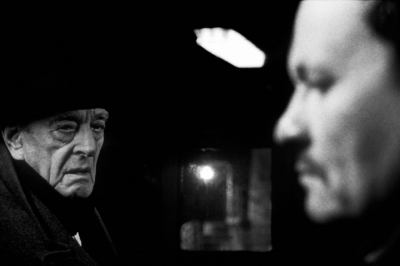Reviews - The Man From London
The Man From London
Reviewed By John Stakes

The Man From London
Béla Tarr, the celebrated 53 years old Hungarian filmmaker can properly be described as a unique talent with such a distinctive directorial style that his films are as instantly recognisable as say a David Lynch or an Ingmar Bergman film.
His style is characterised by long slow takes often in close-up and generally of disadvantaged citizens living on the margins of society who almost invariably have no prospect of rising above their station in life. All his films are in black and white which tell us as much about the lives of these unfortunates as any dialogue which is at best sparse.
At two hours fifteen minutes last Sunday’s The Man From London was one of his shorter films but still demanded a level of patience far beyond the limits of the casual cinemagoer in order to extract a return on the viewer’s investment. This was Tarr’s first truly international film and his most costly to date, the demands in the making of which were to stretch all concerned to the limit and may have led to the suicide of his co-producer and business partner Humbert Balsam to whom the film is dedicated.
The plot was taken from an early Georges Simenon short story of the same name, with the setting changed from Dieppe to the Corsican port of Bastia and the time setting made deliberately obscure. From his elevated watch-tower position on the port front, night watchman and railway pointsman Maloin spots a quayside fight break out between two men over what turns out to be a suitcase containing £60,000 which Maloin decides, on the spur of the moment, to appropriate to himself.
In the book a murky tale then develops which, translated into film, would easily lend itself to a “film-noir” style of presentation, and, in purely visual terms, Tarr initially presents us, in a long opening take, with a shadowy, dimly lit and disorientating scene (somewhat reminiscent of The Third Man) shot in middle distance so that none of the features of the two men or of the other passengers can be made out.
However, Tarr eschews the intense plot twisting and dense narrative normally associated with the genre and presents us with a pared down plot and minimal dialogue coupled with long, slow, silent and static close-ups of the characters. Tarr is primarily concerned as to the effect on Maloin and his life having taken the money and not about the fate of the money itself. It is by this method that he makes us aware of their thoughts and feelings whether they speak or not and irrespective of what they say. It is left to lugubrious private detective Morrison from London (with a wonderfully intoned voice-over from Edward Fox) and to Maloin’s estranged wife (a ranting Tilda Swinton) to amplify events and put any flesh on the bones of the story.
At the same time however Tarr clothes many sequences in mystery by clever use of light and darkness and camera movement through windows and railings which forces the audience to question the reality of events until the point at which Tarr chooses to unveil it. This is epitomised by his technique in many scenes where the camera focuses on and follows the characters from a rear perspective and then the process is completely reversed and we witness the effect of a particular event etched on their faces.
The film was a tantalising, haunting, frustrating and at times an exasperating experience which tested audience patience to the limit. But there is no denying Tarr’s talent and his take on the world as experienced by ordinary people. It would be quite wrong to treat this film merely as art house fodder and the Club was being entirely true to its remit in giving audiences the opportunity to experience the challenging work of Tarr and other respected film directors from around the word however “difficult” their material may seem.
His style is characterised by long slow takes often in close-up and generally of disadvantaged citizens living on the margins of society who almost invariably have no prospect of rising above their station in life. All his films are in black and white which tell us as much about the lives of these unfortunates as any dialogue which is at best sparse.
At two hours fifteen minutes last Sunday’s The Man From London was one of his shorter films but still demanded a level of patience far beyond the limits of the casual cinemagoer in order to extract a return on the viewer’s investment. This was Tarr’s first truly international film and his most costly to date, the demands in the making of which were to stretch all concerned to the limit and may have led to the suicide of his co-producer and business partner Humbert Balsam to whom the film is dedicated.
The plot was taken from an early Georges Simenon short story of the same name, with the setting changed from Dieppe to the Corsican port of Bastia and the time setting made deliberately obscure. From his elevated watch-tower position on the port front, night watchman and railway pointsman Maloin spots a quayside fight break out between two men over what turns out to be a suitcase containing £60,000 which Maloin decides, on the spur of the moment, to appropriate to himself.
In the book a murky tale then develops which, translated into film, would easily lend itself to a “film-noir” style of presentation, and, in purely visual terms, Tarr initially presents us, in a long opening take, with a shadowy, dimly lit and disorientating scene (somewhat reminiscent of The Third Man) shot in middle distance so that none of the features of the two men or of the other passengers can be made out.
However, Tarr eschews the intense plot twisting and dense narrative normally associated with the genre and presents us with a pared down plot and minimal dialogue coupled with long, slow, silent and static close-ups of the characters. Tarr is primarily concerned as to the effect on Maloin and his life having taken the money and not about the fate of the money itself. It is by this method that he makes us aware of their thoughts and feelings whether they speak or not and irrespective of what they say. It is left to lugubrious private detective Morrison from London (with a wonderfully intoned voice-over from Edward Fox) and to Maloin’s estranged wife (a ranting Tilda Swinton) to amplify events and put any flesh on the bones of the story.
At the same time however Tarr clothes many sequences in mystery by clever use of light and darkness and camera movement through windows and railings which forces the audience to question the reality of events until the point at which Tarr chooses to unveil it. This is epitomised by his technique in many scenes where the camera focuses on and follows the characters from a rear perspective and then the process is completely reversed and we witness the effect of a particular event etched on their faces.
The film was a tantalising, haunting, frustrating and at times an exasperating experience which tested audience patience to the limit. But there is no denying Tarr’s talent and his take on the world as experienced by ordinary people. It would be quite wrong to treat this film merely as art house fodder and the Club was being entirely true to its remit in giving audiences the opportunity to experience the challenging work of Tarr and other respected film directors from around the word however “difficult” their material may seem.
Find A Film
Search over 1500 films in the Keswick Film Club archive.
Friends
KFC is friends with Caldbeck Area Film Society and Brampton Film Club and members share benefits across all organisations
Awards
Keswick Film Club won the Best New Film Society at the British Federation Of Film Societies awards in 2000.
Since then, the club has won Film Society Of The Year and awards for Best Programme four times and Best Website twice.
We have also received numerous Distinctions and Commendations in categories including marketing, programming and website.
 Talking Pictures
The KFC Newsletter
Talking Pictures
The KFC Newsletter
Links Explore the internet with Keswick Film Club


